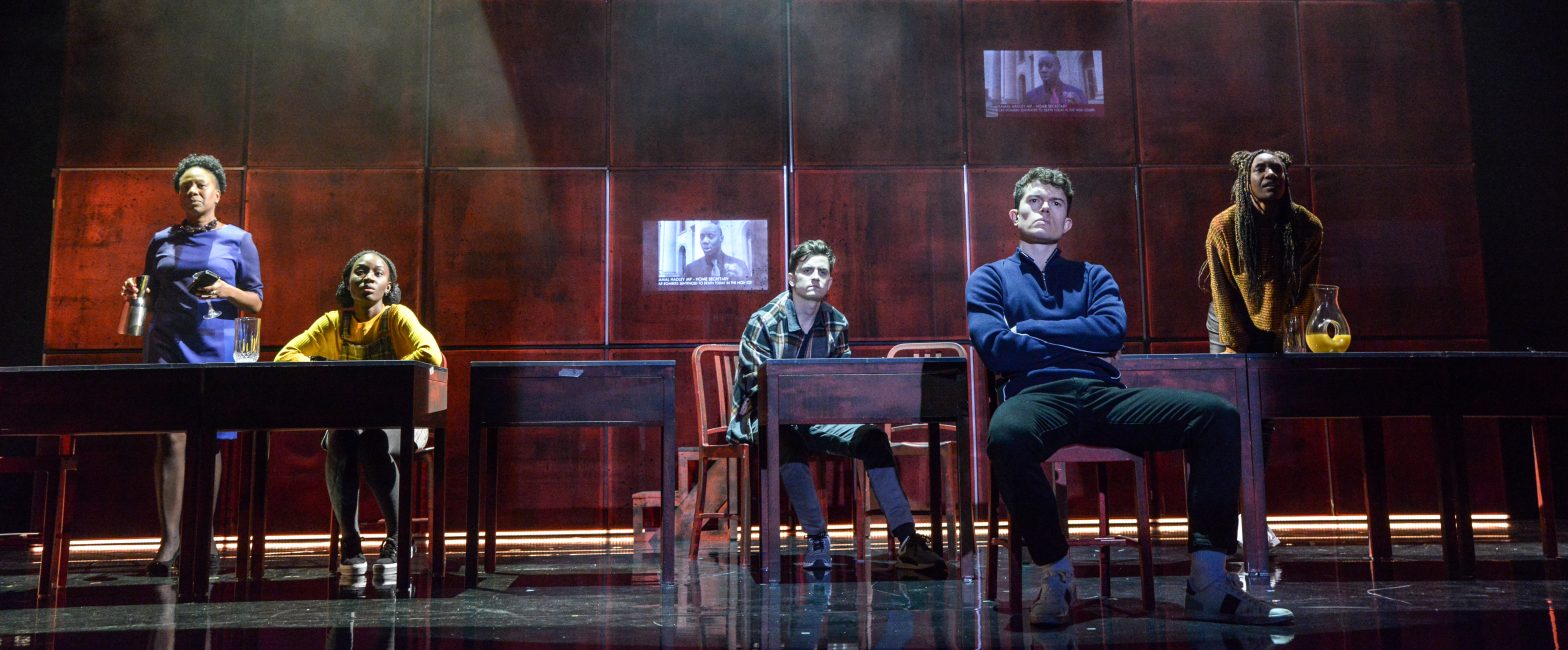I remember my 10 year old self reading Noughts and Crosses for the first time and inhaling every page. At the time, most of the fictional characters available to me were white, so it felt important, revolutionary even, to think of blackness as synonymous with power. Malorie Blackman, the book’s author, became something of a god in my eyes, so much so that when I saw her during the interval of a play last year, I tapped her on her shoulder and said “Thank you. Just… thank you.” See seemed a bit bewildered, but nevertheless smiled.
It probably isn’t a shock, then, that on finding out the book was being revived as a nationally-touring play, 10 year old Nkenna piped up, excited. The show is currently sold out at Theatre Royal Stratford East, where it will stay until closing at Northern Stage in mid-May. I caught an early London showing, and while it disappoints in places, the action certainly kept much of the young crowd riveted. As in the novel, much of the show is built around Sephy’s perspective. Sephy, played by Heather Agyepong, is one of very few formidable young black female characters that I could relate to as a young girl. I caught up with Heather to talk about what playing Sephy meant to her, and why she thinks Noughts and Crosses is still relevant today.
Nkenna Akunna: Tell me a bit about you and the work you’ve done. I remember seeing you in Girls by Theresa Ikoko, which was amazing.
Heather Agyepong: I’m an actor and also a visual artist. A lot of my work surrounds race, mental health and self-portraiture, and I’m grateful to be making work and acting in projects that address similar themes, too.
NA: Wow! And how do you straddle both?
HA: God. It’s so weird that both of them are going really well because usually you have to pick one. But I just dedicate time. I’ll do a show and then I’ll do a commission. Commission work lets me schedule accordingly. And it’s going really brilliantly so far!
NA: I don’t know the last time I heard an artist say that. It must be cool to be acting in a show that played a big part in so many of our childhoods.
HA: Absolutely. It’s such a privilege. Privilege and also pressure, because people LOVE this book. Especially Sephy, who was this well-rounded Black British character, someone I didn’t really see represented growing up. And I was just excited as a black woman to have a story that’s really dominated by her experiences.
NA: You touched on this a bit, but what does it feel like to play Sephy?
HA: Initially it was quite difficult because Sephy is a black, intelligent girl but she’s also from a privileged community. There are elements of that experience that I’ve never felt before. And I found relating to that quite difficult. But also realising, I do have my privileges in terms of both my parents being present, being able to go to university, I’ve got a Masters. Trying to think about how those privileges could help inform the character. The cast is half white half black so we’ve had so many conversations with the white cast members about [the experience of racial privilege], about not feeling hypervisible. That’s been an in interesting thing to get my head around.
NA: Almost two decades on, what about the story still resonates with you, perhaps in connection to our current social and political climate?
HA: The book encompasses so many things, especially around culture and privilege. I think everybody in the cast has a personal idea of what it’s about, or what it means to them. What really struck me the first time round was that it was normal for Sephy to see black women in magazines. In this [version of the] play, the director’s approach is to focus on the relationships, the power and privilege. It’s been interesting to understand how different people, and different races, approach the book in different ways. A black audience and a white audience are seeing totally different things.
NA: How has it felt performing the play in all the different spaces?
HA: I’m so glad it’s gone to regional places because the audience have definitely felt a [particular] way. As a black woman I’m like, ‘We go through this all the time.’ But for some people it’s been hard-hitting, which is so wonderful because the breaking of that white privilege is really arresting for some people.
NA: Definitely.
HA: In terms of the empathy with race reversal, I think that gives people a different understanding when they see it in front of their face. Malorie Blackman recently said, she wishes it wasn’t this relevant. How can it be almost 20 years and people are still having this conversation?
Noughts and Crosses is on at the Theatre Royal Stratford East until the 4th May, and at the Northern Stage from the 7th – 11th of May. More information and tickets here.
